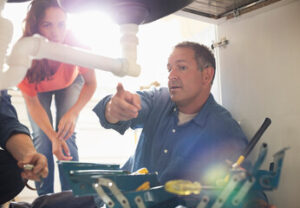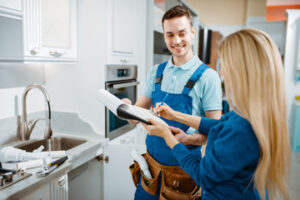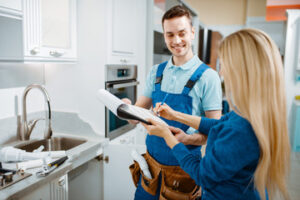Castle Rock Plumbing is the system of pipes, fixtures, and fittings that bring water into buildings and remove wastewater. Plumbers install, repair, and maintain these systems to ensure safe, efficient use of water and removal of waste.

Plumbing has a significant impact on health by providing clean, potable water and removing harmful bacteria and contaminants. Understanding how these systems work is essential for every homeowner.
The water supply system delivers clean, fresh water to homes and businesses. It comprises a network of pipes, valves, and faucets that provide drinking water and remove wastewater. The system also manages rainwater runoff and provides sanitary sewer service. It is vital to the health and safety of a building’s occupants. Poorly maintained plumbing can lead to toxic mold growth, leaks, and sewage backups. Regular maintenance and repairs prevent these issues and ensure the smooth operation of the entire plumbing system.
The water piping in a home is usually made of copper, PVC, or PEX. It is primarily responsible for carrying water from the main line to various fixtures in the residence. These include toilets, showers, sinks, and appliances like dishwashers and washing machines. The pipes in a home’s water supply system are under constant pressure from the water supply, so they need to be properly installed and well-maintained to avoid leaking or bursting.
Besides water, plumbing also deals with the transport of gas and other substances within a building. This includes gas pipes, which deliver natural gas to appliances and water heaters. It also involves venting and drainage systems, which handle waste and sewage from kitchens, bathrooms, and other rooms. The plumbing industry is regulated at both the federal and state levels to ensure public safety and environmental sustainability.
While climate change is not directly related to plumbing, it can affect the availability of clean, safe water in some areas. This is because changing weather patterns may cause more frequent and severe droughts. Additionally, higher temperatures can increase the intensity of rainfall and affect water quality by increasing evaporation rates.
The main water supply line to a building is typically located underground and connects to the water meter. It is essential to the safety of a building’s occupants and must be free of cross-piping connections with non-potable water sources. These can include garden hoses, buckets, lawn puddles, and other sources. In addition, the line should not be in contact with any corrosive materials or contain rust. This is why it is important to have your main water supply lines regularly inspected and maintained by a professional plumber.
Drainage
The plumbing system also includes a drainage component that manages the flow of wastewater and surface water. This ensures that waste is properly disposed of and that the ground stays dry, which is critical for both function and safety. In addition, proper drainage prevents soil erosion and maintains structural integrity of buildings and homes.
The drainage system typically uses drain pipes, catch basins, inlets, and outlets to manage the movement of water throughout a building or property. The pipes are installed at the correct slope and grade to ensure that water moves through them effectively. Inlets and catch basins are designed to collect debris and sediment before it enters the drainage system, helping keep it free of blockages. Outlets discharge water in a designated area, such as a storm drain or natural waterway, to avoid flooding or damage to the surrounding landscape.
Proper drainage is important for both residential and commercial properties. It protects foundations from erosion and water damage, reduces the risk of flooding, and allows for the use of outdoor space during rainstorms. It is also a requirement for many construction projects, including apartment complexes and shopping centers.
The plumbing industry is highly regulated to ensure public health and safety. Plumbers must be licensed by the state to perform plumbing work, and they must adhere to the UPC (Uniform Plumbing Code). The UPC sets standards for fixture flow rates, drain slope, and cleanouts, among other things. It also regulates how plumbing systems are designed and installed to protect against leaks, floods, and other drainage problems. In addition, the UPC requires that plumbing contractors follow environmental best practices to minimize waste and prevent pollution.
Venting
The plumbing system’s waste removal process relies on ventilation to maintain consistent pressure and keep wastewater flowing smoothly. Plumbing vents work alongside drain pipes but instead of transporting waste, they transport air. This helps equalize pressure between all of the drainage pipes to prevent the buildup of wastewater or bad odors in the home. The vents also carry sewer gases away from your house, preventing them from entering rooms through the drains.
The u- or s-shaped bent pipes you see under your sink, toilet, bathtub and shower are vent pipes. They’re usually located near each fixture in a home and connect to a common vent stack on the roof. You’ll also find re-vent pipes or auxiliary vents, which are used in place of true vent stacks when it’s not possible to get to the roof to run a pipe.
All of these pipes function together to create a balanced plumbing system, and when they’re all in working condition, they keep water and waste flowing through your home without clogs or backups. However, plumbing vents can become clogged or disconnected due to a variety of factors.
Plumbing vents are exposed to the elements, so they often become blocked by rodents, birds and leaves. They can also clog with sludge or debris from a home’s drains. When a vent becomes blocked, it can cause wastewater to back up into drains and even into rooms. Signs of a clogged vent include water that drains slowly from fixtures, or gurgling sounds heard when the toilet or sink is flushed.
If you suspect a problem with your plumbing vents, it’s important to contact a plumber right away. A professional can examine the system to determine if the issue is caused by a physical blockage in the pipe or a clog in one of your drains. A plumber can perform a wide range of services to fix these issues, including using a drain snake to break up sludge in the line and cleaning out the vent with a vacuum pump.
Unlike a clogged drain, which can be solved by plunging or using an auger, a clogged vent may require more extensive repair work. For example, a plumber can use a drain camera to locate the clog in your vent and then remove it with a snake or high-pressure jet.
Sanitation
Sanitation is an essential aspect of human life, ensuring we have clean water and waste removal systems to protect our health. This includes environmental sanitation, which involves disposing of trash and controlling disease vectors, as well as personal sanitation, such as washing our hands frequently and practicing proper food handling. Plumbing is an important part of both, supplying clean water to our homes and removing dirty water and waste. Maintaining a fully functional plumbing system can prevent costly repairs and even health hazards.
Plumbers are required to adhere to strict codes and standards to ensure their work is safe and up to code. These rules help reduce the risk of leaks and water contamination in residential and commercial buildings. They also promote sustainable practices to protect the environment and the safety of occupants. Regular inspections and timely repair of plumbing issues can prevent problems such as foul odors from degrading indoor air quality.
Plumbing codes and regulations vary from state to state. Federal regulations, set by agencies like the Environmental Protection Agency (EPA), establish broad standards for drinking water quality and the use of materials in plumbing fixtures. State regulations are more specific, addressing factors like water conservation and seismic safety in earthquake zones. Plumbers must obtain a license and pass an exam to become certified, and they are often required to attend continuing education courses to stay abreast of new technologies and best practices in the industry.
Leaking pipes create unsightly stains on walls and ceilings, which degrade indoor space and signal poor maintenance. They can also contaminate the surrounding soil and water supply, leading to widespread health risks. In addition, clogged drains foster the growth of bacteria and molds that produce unpleasant odors and may cause respiratory infections in sensitive individuals.
To minimize the potential for clogs and other plumbing issues, homeowners should practice good garbage disposal habits. They should never flush non-biodegradable items, such as grease or large food particles down the drains, and they should keep plants away from sewage lines to avoid root intrusion. Regular professional inspections can catch problems early and help keep drains clear of debris buildup, preventing costly and disruptive backups and other issues.



